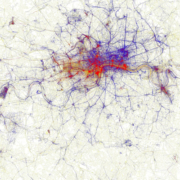A Sharing Culture

by Maggie Flickinger
From Scott DuPree of Civil Society Transitions, I heard of the Zimbabwean idea of qoqelela: a community funded trust that allows individuals and families in the community to take turns purchasing things they wouldn’t have the means to otherwise – things that in turn help the community’s stability, such as livestock or looms. As Scott told, this tradition was formalized and expanded with the grouping of 40,000 tribespeople’s donations of $5 each to form a multi-tribe community foundation. The first four dollars were allocated according to the foundation’s rules, but the fifth dollar was somewhat of a mystery – would the initial donators demand that it be viewed as a return in their investment – directly given back to their tribe or themselves as individuals? Scott and his group met with representative tribespeople around a ceremonial fire and posed the fifth dollar question. In a confident voice a tribeswoman stood and said, “No, of course we do not expect this money to come back to us. Our dream is that the foundation will help everyone, that it will build a better future for everyone in our region. We know this future may be something that those of us here will never know.” Another woman chimed in, saying that “it would make no sense for us to benefit at the expense of our neighbors.”
A friend living in Scandinavia related the Nordic practice of parking on the outskirts if you arrive at the office early, since you have extra time to walk across the neighborhood or lot, allowing those who slept through their alarms to get spots “up front” and dash in before the clock hits 9. Contrast that to our prevailing attitude of “me first” where we stalk the parking lot for the closest spot regardless of whether or not we’re in a rush.
These stories are the perfect summary of the compassionate mindframe versus the individualistic mindframe. And there are many more like them – some from unlikely sources, such as a national call center that saved over a million dollars in training costs just by asking their workers what they wanted. It’s just this shift in mindset that Barrett Studio has sought to tackle since David founded it in 1977. How can we create a sharing culture – a culture of compassion? I’ll be traveling to Chicago tomorrow to speak at the American Institute of Architects convention on our approach to formalizing this commitment.
At its core, compassion is about acknowledging, sympathizing with, and wanting to alleviate someone’s problem. Try sitting around a table and asking your coworkers what would better their lives with you. Make sure your chat is focused on solutions, with timelines for implementation. You might have to have a thick skin, but the results are worth it. We’ve enacted policies that range from including the community as a partner in our profit distribution, to recognizing different stages in life by allowing employees to choose between extra paid time off or extra salary. My favorite idea that we’re exploring now is tackling the alarming issue of student loan debt. We know that the average student graduates with almost $30,000 in debt. In noticing that our younger employees – emerging professionals – were not contributing to their SIMPLE retirement plans – which would be matched by the studio – we saw a correlation. They were choosing to pay down their student loans before making another investment. To kickstart the process, why not offer a student loan matching payment as an alternative to a SIMPLE matching benefit? Unfortunately, it’s not tax deferred, but it helps these important members of our team feel acknowledged and cared for.
That’s the magical thing about compassion in the workplace helping people transition away from an individualistic mindframe. You can get people to stop just thinking about themselves by making sure they know you’re thinking about them. Turns out that making people matter is infectious!
At the convention, I’ll be asking those attending my talk to share their stories of compassion in the workplace, or problems in the workplace that could be solved through compassion. I’ll post some of these stories here, in the spirit of building a sharing culture. My hope is that we’ll all start experiencing our businesses with a qoqelela attitude!




















What a wonderful message! Would love to hear your presentation at the American Institute of Architects convention. Will they be sharing it with the public?
Thanks for your note! Unfortunately there was a technical glitch and it did not get recorded! I am working on putting together a video of the slides with a voiceover and will let you know as it’s ready!
Best, Maggie